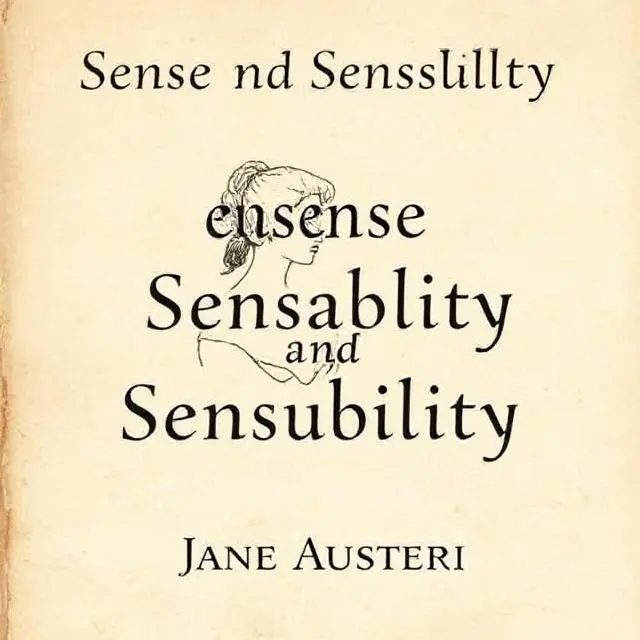Sense and Sensibility by Jane Austen – A Timeless Tale of Heart vs. Mind
Jane Austen’s Sense and Sensibility is more than just a romantic novel—it’s a masterclass in character development, societal commentary, and the exploration of human nature. First published in 1811, this novel continues to captivate readers over two centuries later. Its compelling exploration of the balance between rational thought and emotional spontaneity makes it relevant to this day.
In this comprehensive review, we’ll walk through the plot, explore its iconic characters, uncover the themes and motifs, and reflect on Austen’s sharp wit and narrative brilliance.
A Brief Overview: What is Sense and Sensibility About?
At its core, Sense and Sensibility tells the story of two sisters—Elinor and Marianne Dashwood—who, after the death of their father, are left in a financially vulnerable position. The story traces their contrasting approaches to love, heartbreak, and social expectations in 19th-century England.
- Elinor represents “sense”—rationality, restraint, and social conformity.
- Marianne embodies “sensibility”—emotion, impulsiveness, and romantic idealism.
Their journeys through love and loss, betrayal and redemption, provide the emotional backbone of this novel.
Character Analysis
Elinor Dashwood – The Pillar of Reason
Elinor is the eldest Dashwood sister, often praised for her composure, maturity, and deep sense of responsibility. She suppresses her feelings for Edward Ferrars for the sake of decorum and her family’s well-being. Elinor’s struggle is internal—she battles silently with disappointment and heartache, choosing duty over desire.
Elinor represents a quiet strength. Austen portrays her as the emotional anchor of the family, someone who endures pain with grace. Her character is a sharp critique of societal expectations that often demand emotional restraint from women.
Marianne Dashwood – The Spirit of Romanticism
Marianne is a stark contrast to Elinor. She wears her heart on her sleeve and dreams of passionate, poetic love. Her whirlwind romance with John Willoughby epitomizes her youthful idealism. When that relationship ends in betrayal, Marianne is emotionally shattered.
Through Marianne’s journey, Austen doesn’t punish emotional expression but highlights the importance of balance. Marianne matures, not by abandoning her sensibility, but by tempering it with experience and wisdom.
Edward Ferrars – The Reserved Suitor
Edward is Elinor’s love interest, a man caught between duty and desire. His reserved nature and engagement to another woman (Lucy Steele) create significant tension. Edward’s moral compass is commendable, yet his indecisiveness causes pain for both Elinor and himself.
Colonel Brandon – The Gentleman with Depth
Colonel Brandon is perhaps the most underestimated character. He is older, calm, and deeply loyal. His quiet affection for Marianne contrasts sharply with Willoughby’s flamboyance. Brandon’s unwavering love and integrity eventually win Marianne’s heart—not through drama, but through constancy.
John Willoughby – The Charmer with a Dark Side
Willoughby is the classic romantic rogue—handsome, passionate, but unreliable. His relationship with Marianne feels like a dream come true until his true character is revealed. Willoughby serves as a warning against blind romanticism and superficial charm.
Key Themes in Sense and Sensibility
1. Reason vs. Emotion
This is the central theme. Elinor and Marianne personify the conflict between logic and feeling. Austen doesn’t clearly favor one over the other. Instead, she suggests that a successful life—and love—requires a balance of both.
2. Social Class and Inheritance
The Dashwood sisters’ financial struggles reflect the rigid social structure of the time. Women were largely dependent on marriage for social mobility. Austen critiques this system subtly, illustrating how money often influences marriage more than love.
3. Marriage and Morality
Austen’s novels often revolve around marriage, but she goes beyond romance. In Sense and Sensibility, she examines marriage as a social contract, a moral test, and a reflection of character.
4. Female Agency and Expectations
Despite living in a patriarchal society, the Dashwood sisters make choices that reflect their integrity and independence. Austen celebrates this quiet resistance to societal norms.
5. The Pain of Growing Up
Both Elinor and Marianne undergo significant emotional growth. Austen explores how heartbreak, disappointment, and time shape who we become. The journey from innocence to understanding is a poignant element of the novel.
Writing Style and Tone
Austen’s prose is elegant, sharp, and laced with irony. Her ability to capture the intricacies of social interaction and human behavior is unmatched. She uses dialogue brilliantly to reveal character motives and relationships.
Though the language may feel formal to modern readers, it’s rich with subtext and wit. Austen’s narration dances between close observation and subtle satire, making the book a joy to reread.
Historical Context and Publication
Sense and Sensibility was Austen’s first published novel, released anonymously in 1811. At the time, the literary world was dominated by male authors and sensational Gothic fiction. Austen’s grounded, domestic focus was revolutionary.
She challenged societal norms—not through grand rebellion, but through detailed portrayals of everyday life. Her novels helped shape the domestic realist genre and continue to influence literature today.
Adaptations of Sense and Sensibility
The novel has inspired numerous adaptations:
- 1995 Film (Directed by Ang Lee) – Starring Emma Thompson (who also wrote the screenplay), Kate Winslet, Hugh Grant, and Alan Rickman. This adaptation received critical acclaim and brought Austen’s story to a new generation.
- 2008 BBC Miniseries – A more detailed version with a faithful tone and gorgeous period aesthetics.
- Stage Adaptations – Many theater renditions highlight the drama and humor of Austen’s story.
Each version brings out different nuances of the story, proving its timeless appeal.
Why Sense and Sensibility Still Matters
In a world that often pits logic against feeling, Sense and Sensibility remains profoundly relevant. It’s a reminder that both reason and emotion have their place in decision-making. Austen teaches us that love, character, and integrity endure—even in an unpredictable world.
The book also resonates because it deals with universal emotions—love, betrayal, hope, and growth. Whether you’re reading it in 1811 or 2025, the truths at its core remain the same.
Favorite Quotes from the Book
“Know your own happiness. Want for nothing but patience – or give it a more fascinating name: Call it hope.”
“I can feel no sentiment of approbation inferior to love.”
“It is not everyone,” said Elinor, “who has your passion for dead leaves.”
“Sometimes one is guided by what they say of themselves, and very frequently by what other people say of them, without giving oneself time to deliberate and judge.”
Each quote captures Austen’s subtle humor and emotional depth. They’re small windows into the larger themes of the novel.
Final Thoughts: Who Should Read Sense and Sensibility?
This book is for:
- Lovers of classic literature
- Fans of character-driven stories
- Readers seeking a balance of romance and realism
- Anyone curious about historical social dynamics
- People exploring Jane Austen’s works beyond Pride and Prejudice
It’s not just a love story—it’s a life story. A story about learning to navigate a world that often demands we choose between heart and mind.
Pros and Cons
Pros:
- Timeless themes
- Rich character development
- Elegant prose
- Insightful social commentary
Cons:
- Slow pacing for modern readers
- Period language can be challenging initially
Similar Books You Might Enjoy
- Pride and Prejudice by Jane Austen
- Emma by Jane Austen
- Jane Eyre by Charlotte Brontë
- North and South by Elizabeth Gaskell
- Little Women by Louisa May Alcott
These novels continue the tradition of emotionally complex female leads and thoughtful social commentary.
Final Rating: ★★★★☆ (4.5/5)
Sense and Sensibility is a classic for a reason. It’s emotionally intelligent, quietly revolutionary, and endlessly re-readable. Though it may take time to adjust to the language and pacing, the rewards are rich and lasting.







